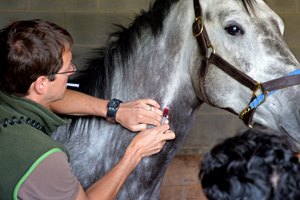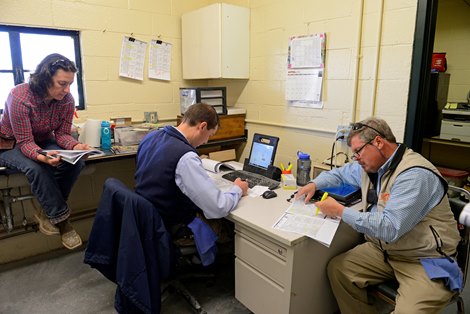KHRC Meet Looks to Hold Implementation of Lasix Rule


The Kentucky Horse Racing Commission met Oct. 31 in Lexington at the Kentucky Horse Park to continue the forward movement of projects underway, which were put in motion during earlier committee meetings this year.
The KHRC acknowledged the request to put on hold the Horseracing Integrity and Safety Authority's implementation of the use of race-day Furosemide (Lasix) in covered horse races other than 2-year-old covered horses and stakes races was acknowledged. HISA offered states this option and many are taking it—essentially keeping in place the current Lasix policy in Kentucky.
With the move, Kentucky is aligning with other United States racing jurisdictions beginning Jan. 1, 2023. The approach is supported by the Kentucky Thoroughbred Association and Kentucky Horseman's Benevolent and Protection Agency. During this time, HISA will conduct research to determine the impact on health and welfare in racehorses.
"Such an exemption would allow Kentucky to continue restricting furosemide in 2-year-olds and stakes races but would not require Kentucky to restrict furosemide use in other races during this three-year study period," said equine medical director Bruce Howard in support.
KHRC director of incentives and development Drew Conners announced the Kentucky Thoroughbred Development Fund would carry over a total of $2.8M in funds from previous meets this year to the 2022 Churchill Downs fall meet. KTDF purses will distribute $4.1M-$4.9M and pay out from first through last place to eligible horses.
The upcoming Turfway Park meets will race over 67 race days, with 19 days during the Holiday meet from Nov. 30-Dec. 31 and the remaining 48 days to run during the 2023 winter-spring meet beginning Jan. 1. An estimated $9.5M-$10M in KTDF purse funds will be distributed, with the KTDF continuing to pay out first through last to eligible horses.
Churchill Downs will receive the requested funds of $8,137 for the installation of Wi-Fi equipment for the horsemen on the backside, to be implemented immediately.

The Kentucky Equine Drug Research Council has voted for funding to conduct a study titled, 'Tackling Emerging Threats to the Kentucky Racing Industry by Development of an Equine Gene Doping Program,' to be headed by Dr. Scott Stanley and Dr. Cecily Wood. Funding of $241,000 will be granted for the two-year period in which research will be conducted in conjunction with the Japan Racing Association.
Dr. Warrick Bailey and Dr. David Lambert have been conducting a study using sensors to help 'Identify Racehorses in Danger of Catastrophic Injury through Analysis of Motion Sensor Data Collected during Training and Racing.' The study has been accepted, most recently, by prominent trainers at Kentucky Downs, who have agreed to assist with horses wearing the motion sensors during training. The sensors help identify and develop a fingerprint for each horse's stride, and with further data collection, this will be used to help reduce injury and death on the racetrack. The further data collection from approximately 2,000 training sessions will be funded by $128,723, appointed by the KHRC.
Reports from the 2022 Ellis Park, Churchill Downs, Kentucky Downs race meet rulings, and veterinary division is available online here.
